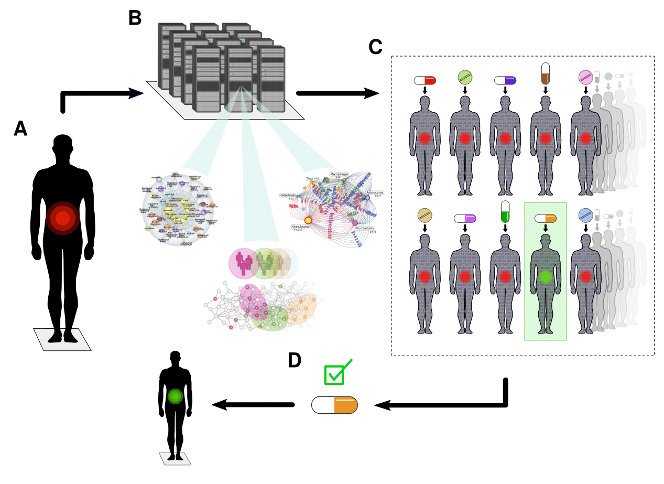Medical Digital Twin Research Group
-
One of the most important health care problems is that many patients with common disease like immunological, malignant and cardiovascular diseases do not respond to treatment. This reflects the complexity and heterogeneity of diseases. Each disease may involve thousands of genes, which vary across billions of cells in many organs, as well as between time points and patients with the same diagnosis. There is a wide gap between this complexity and modern health care, which often relies on diagnostic and therapeutic targeting of a small number of genes.
We aim to address these problems by digital twins (DTs) of individual patients. DTs are computational models based on clinical routine and multi-omics data, down to the single cell level. DTs are computationally treated with thousands of drugs to find the optimal drug or drug combination for individual patients (see figure below).

Our long-term aim is that each willing individual will be offered her/his own DT for early prediction and prevention of disease. Our group consists of clinical, bioinformatics, omics and experimental researchers, which are also part of the Swedish Digital Twin Consortium (website SDTC.se). We are partners in the DOCTIS EU consortium (https://doctis.eu), which uses DTs for personalised combinatorial treatment of patients with immunological diseases.
Visiting address
Widerströmska Huset
Tomtebodavägen 18A
171 65 Solna
Delivery address
Medical Digital Twin Research Group
Tomtebodavägen 18A
171 65 Solna
Want to learn more about us and how researchers can use Digital Twins for predictive, preventive and personalised medicine?
Please visit the SDTC website (sdtc.se), which contains links to publications, recorded talks at Harvard and SciLifeLab, publications, TV interviews and a music video created by collaborating artists and a composer at the Royal College of Music. Also, there is a recorded workshop about medical digital twins organised by the US National Academy of sciences engineering and medicine, in January 2023, in which SDTC was represented with a talk.
Group Members
Mikael Benson, group leader, MD, PhD
Zsuzsanna Larsson Gilice, artist
Xinxiu Li, clinical research coordinator, MD, PhD
Firoj Mahmut, post doc
Dina Mansour Ali, post doc
Samuel Schäfer, MD, PhD student
Martin Smelik, PhD student
Oleg Sysoev, senior lecturer, PhD
Yelin Zhao, PhD student
Yiran Wang, candidate PhD student
Selected Publications
Lilja S, Li X, Lee EJ, Loscalzo J, Zhang H, Zhao Y, Gawel D, Wang H, Benson M. Multi-organ single cell analysis reveals an on/off switch system with potential for personalized treatment of immunological diseases. Cell Reports Medicine 2023:(3):100956. doi: 10.1016/j.xcrm.2023.100956
Li X, Lee EJ, Lilja S, Bohle B, Loscalzo J, Schäfer S, Zhang H, Gustafsson M, Zhao Y, Gawel D, Wang H, Benson M. A dynamic single cell-based framework for digital twins to prioritize disease genes and drug targets. Genome Medicine 2022
Mansour Aly D, Dwivedi OP, Prasad RB, Käräjämäki A, Hjort R, Thangam M, Åkerlund M, Mahajan A, Udler MS, Florez JC, McCarthy MI; Regeneron Genetics Center, Brosnan J, Melander O, Carlsson S, Hansson O, Tuomi T, Groop L, Ahlqvist E. Genome-wide association analyses highlight etiological differences underlying newly defined sub types of diabetes Nat Genet. 2021 Nov;53(11):1534-1542.
Björnsson B, Borrebaeck C, Elander N, Gasslander T, Gawel DR, Gustafsson M, Jörnsten R, Lee EJ, Li X, Lilja S, Martínez-Enguita D, Matussek A, Sandström P, Schäfer S, Stenmarker M, Sun XF, Sysoev O, Zhang H, Benson M; Swedish Digital Twin Consortium. Digital twins to personalize medicine. Genome Medicine 2020;12(1):4.
Jia G, Li Y, Zhang H, Chattopadhyay I, Boeck Jensen A, Blair DR, Davis L, Robinson PN, Dahlén T, Brunak S, Benson M, Edgren G, Cox NJ, Gao X, Rzhetsky A. Estimating heritability and genetic correlations from large health datasets in the absence of genetic data. Nature Communications. 2019;10(1):5508
Lentini M, Lagerwall M, Vikingsson S, Mjoseng HK, Vogt H, Green H, Meehan RR, Benson M*, Nestor CE*. Pervasive experimental errors have severely distorted our understanding of mammalian epigenetics. Nature Methods 2018; 15:499-50.
Shalek AK, Benson M. From bench to bedside: Single-cell RNA-sequencing to personalize medicine. Science Translational Medicine 2017;9(408)
Mika Gustafsson.. Colm E. Nestor, Mikael Benson. A validated gene regulatory network and GWAS identifies early regulators of T-cell associated diseases. Science Translational Medicine 2015;7(313):313ra178
S. Bruhn, Y. Fang, F.Barrenäs, M. Gustafsson,H. Zhang, A Konstantinell, A. Krönke, B. Sönnichsen, A. Bresnick, N. Dulyaninova, H. Wang, Y. Zhao, J. Klingelhöfer, N Ambartsumian, MK, Beck, C. Nestor, E Bona, Z. Xiang, M. Benson. A generally, applicable module-based translational strategy identifies a key diagnostic and therapeutic candidate gene in allergy. Science Translational Medicine 2014:8;6(218)
